Leading 24V lithium battery manufacturer
Seeking the 24V Lithium Battery for your project?
24V lithium battery is one of the common voltage for different kinds of applications, such as Solar system, mobile robot, AGV/AMR, electric scooter marine motor, etc.
Keheng use different lithium material battery (NMC, LFP, LTO ) to design the different battery voltage solutions (12v, 24v 36v 48v HV lithium battery) according to the customers’ needs.
If you need lithium batteries for your business or project, you can find complete lithium battery products at Keheng. Which more than 20+ R&D engineers and 3 semi-automatic lithium battery pack assembly lines.
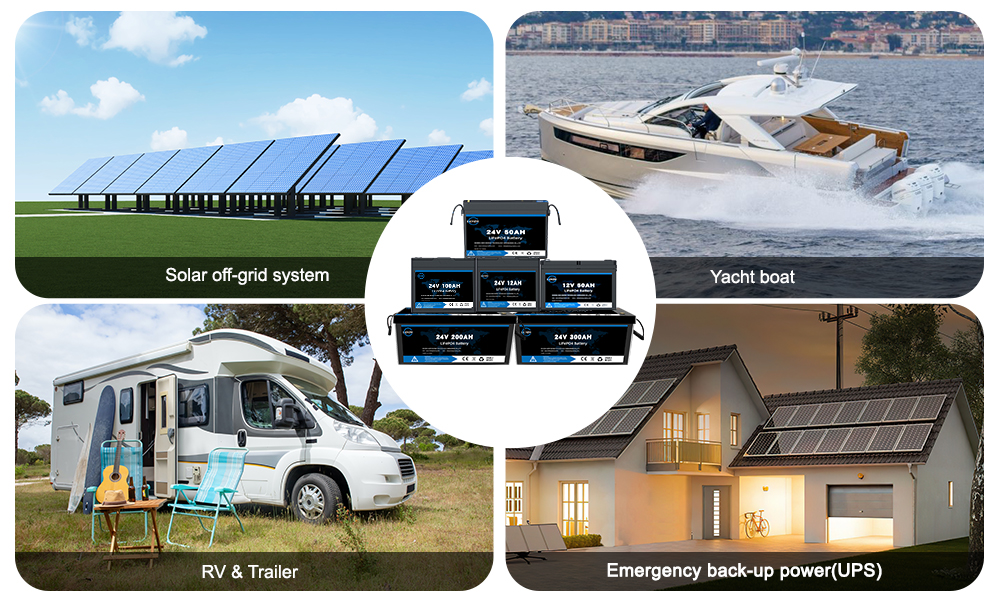
Power Up with Keheng 24V Lithium Battery Solutions
Keheng customizable 24V Lithium Batteries for Every Energy Storage Need. Tailored capacity, voltage, and unique functions – all at your fingertips.
Why Our 24V lithium batteries set apart
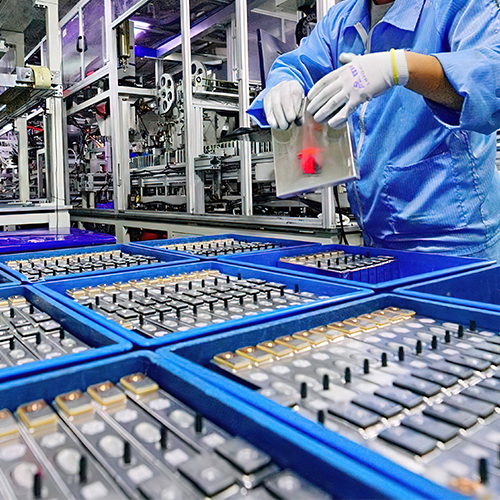
Top battery cell brands
Keheng use the cells of BYD, EVE, CATL and other first-tier lithium cell manufacturers, grand A and with original QR tracking code with the world's leading technology.
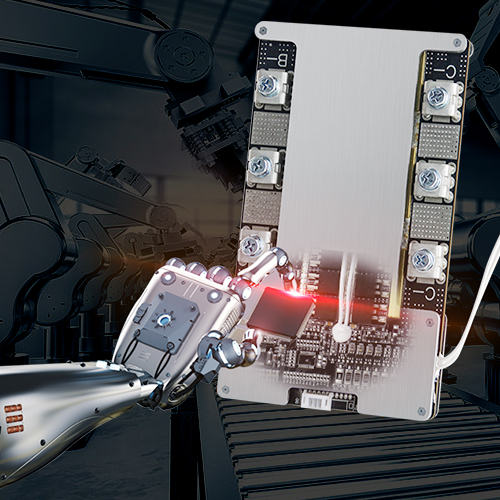
Mature BMS Technology
The BMS equipped with the 24v lithium battery prevent the battery from overcharging and over-discharging. To ensure the safety, availability, ease of use, and service life in the lithium battery system.
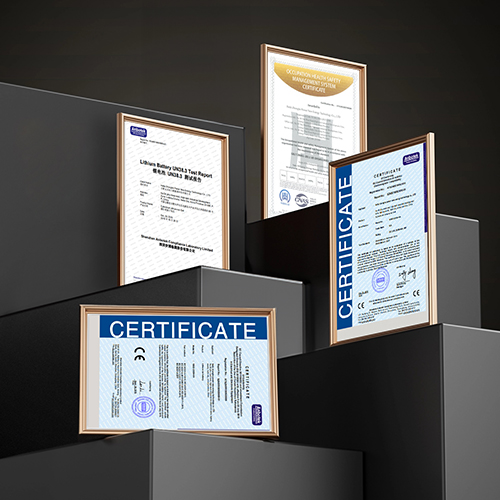
Overall safety and stability
From the smallest plug, a section of cable and even a safety switch must meet the CE certification standards to withstand the test of all kinds of customers and different working conditions.

Customization Service
We offer professional 24v lithium battery solutions to suit different applications. From product design to solution provision, Keheng provide full-stack service.
Why choose keheng as Your 24v lithium battery manufacturer?
For over 15 years, we have been providing professional battery solutions to different applications. Let’s raise your profit to a new level!
ODM/OEM Service
Quickly create custom lithium batteries designed to your needs,support OEM/ODM.
Extream Safety
LiFePo4 lithium is unique chemistry won’t catch fire, overheat, or explode.
100% Test before shipping
We will do the 100% test whatever for the lithium batetry cells or the whole battery pack.
After Sales and Warranty
Good after-sale service, 5 years product warranty and continual technique support.
Keheng 24V Lithium Batteries Powering a Range of Applications
Energize Your Adventures: 24V Lithium Batteries, Ideal for Golf, Marine, Kayak, Solar, RV, and Industrial Uses. Powering your passions with versatility and reliability.
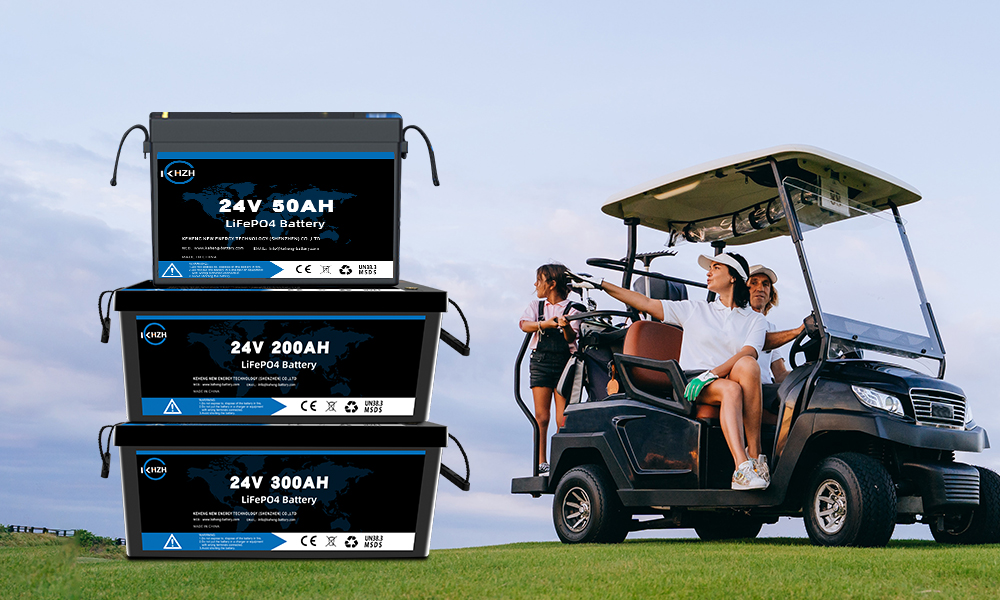
24V lithium batteries for Golf Carts
Our 24V golf cart battery is the most widely used and safest in golf carts. Compared with traditional batteries, it has a longer service life and usage time, which can better decrease the replacement frequency, and lithium batteries are easier to maintain.
24V Lithium Batteries For Marine
If you use a 24V deep cycle marine battery you can power your marine for a longer time and increase efficiency for your work without the need to repeatedly change batteries and lengthen work hours.
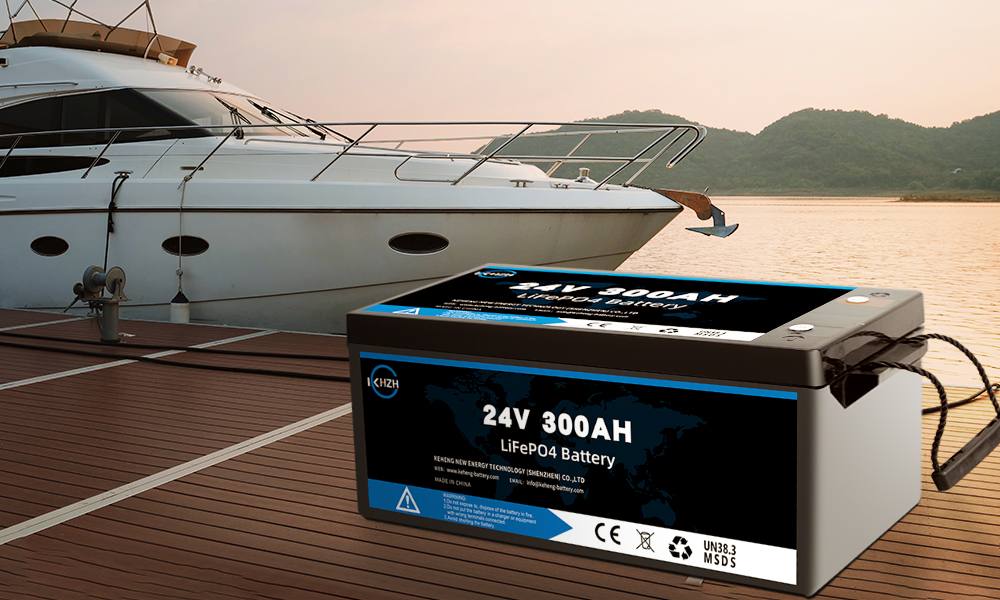

24V Lithium Batteries For Kayak
Need a kayak battery? The 24V kayak lithium battery we provide can provide a higher level of discharge efficiency. This battery can provide you with high discharge efficiency on the water surface and help you work longer on the water travel.
Our 24V lithium batteries support serial and parallel connection and can provide a solar energy storage system for your RV, home, marine, industrial, etc, ensuring the stable output running for the load devices.
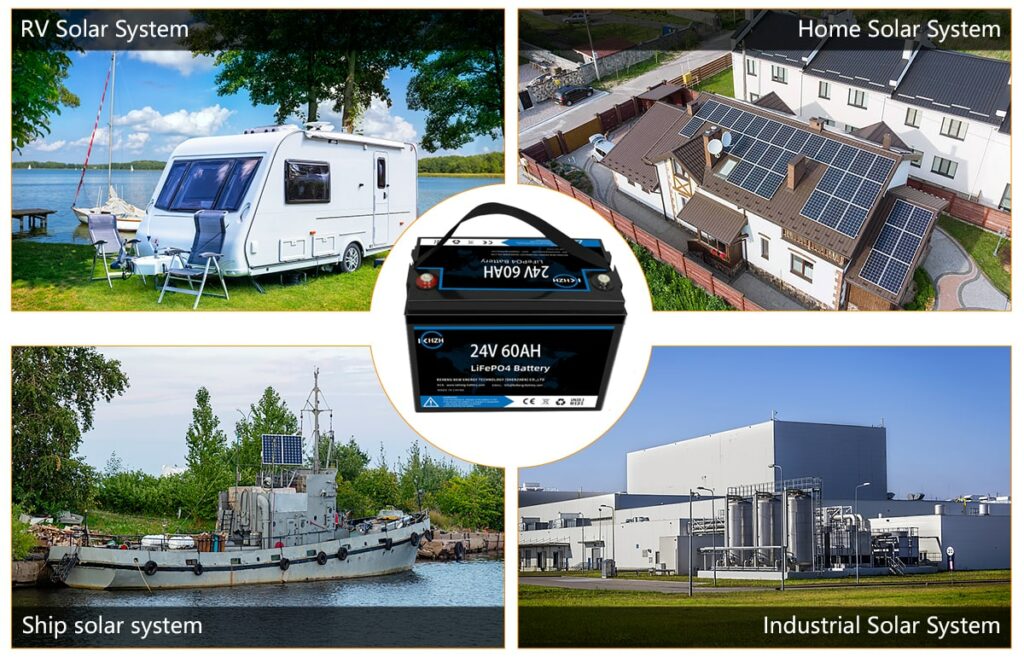
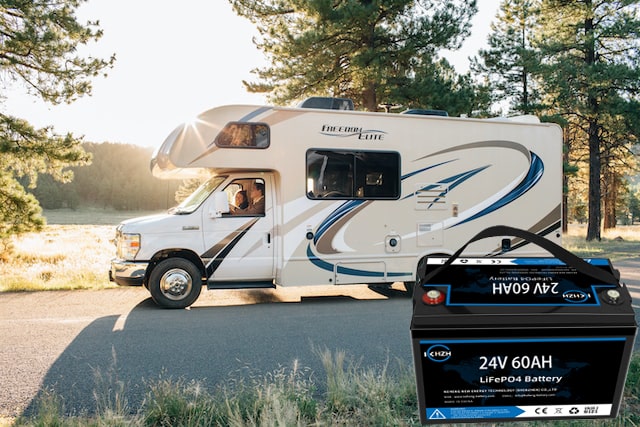
24v lithium Batteries For RV
Experience the Power Revolution in RV Travel: Our 24V Lithium RV Battery, an Engineering Marvel, Ensures Unmatched Performance and Dependability. Power Your Journey Luxuriously.
The Ultimate Guide to 24V Lithium Batteries
The 24-volt 10 amp-hour (Ah) battery recharges in 2 hours. For most applications, a charge time of 3 – 10 hours provides maximum battery life.
It doesn’t matter! Any current between 50 milliamps and 50 amps will charge the battery. The more current you can inject into the battery, the faster it will fill up.
The best method of storage is at low temperatures, not below 0°C, at 40% to 50% capacity.
Several strategies can guide you in determining if your battery needs a 24 volt lithium battery charger. First, you can check the voltage rating of your battery. If you have a 12v lithium battery, then a 24-volt Li-Ion battery charger is not necessary. You can also check the battery’s amp-hour (Ah) rating, which you can usually find on the label on the top of the battery. If the current rating exceeds 100 amps, then a 24 volt lithium battery charger is required for this type of battery.
What is a 24V lithium battery?
- 24V lithium batteries are rechargeable batteries that provide a voltage output of 24 volts. These batteries utilize lithium-ion technology, which offers several advantages over other battery chemistries.
- Lithium-ion batteries are known for their high energy density, allowing them to store a significant amount of energy in a compact size. This makes them ideal for applications that require a portable power source with a long runtime.
- These qualities make them a preferred choice for various applications, including RV, renewable energy storage systems, Marine, Leisure Battery, Mechanical equipment, Kayak, Golf carts, Electric Outboard Motor, UPS (uninterruptible power supply) units, and more.
Difference between 12V and 24V batteries
- The primary distinction between a 12V and a 24V battery lies in the power they pack. A 24V battery essentially holds double the power of a 12V battery, given the same “Ah” rating. This is because the energy stored in a battery is the product of voltage and ampere-hours.
- 12V lithium-ion battery systems are ubiquitous, largely due to the automotive industry’s reliance on 12V parts. Generators provide a 12V charge to power most vehicles. Moreover, many RV-related products, such as refrigerators and various lighting fixtures, operate on 12V. A 12V system requires only a single battery, making it perfect for low-power applications with limited wiring routes. The simplicity of a 12V system, combined with its compatibility with most RV products, has made it a popular choice. When paired with a small solar system, the setup process is straightforward.
- On the other hand, a 24V system offers the advantage of using wires with smaller diameters, effectively halving the current draw. This not only saves on wiring costs but also conserves space – an especially beneficial aspect when dealing with a large number of wires. Higher voltage systems don’t require as much current as lower voltage systems to deliver the same power. As a result, we can utilize smaller currents and, therefore, smaller wires. This is why power cords are often designed to carry high voltages – enabling them to deliver more power while remaining compact. Additionally, a 24V system can run motors and inverters more efficiently due to shorter wires. Typically, a 24V solar controller demands twice the solar input than its 12V counterpart.
24V Advantages of lithium batteries
They are lighter and more compact, making them easier to handle and install.24V lithium batteries offer high energy density, lightweight design, consistent voltage output, low self-discharge, and built-in safety features.
How to charge a 24V lithium battery?
- Ensure you use the correct charger: Always use a charger specifically designed for lithium batteries, ensuring that its output voltage and current are compatible with the requirements of a 24V lithium battery. Using an incompatible charger can lead to battery damage or safety hazards.
- Monitor the charging process: Regularly keep an eye on the battery’s charging status while it is being charged. Some chargers come with a display or indicator light that shows the progress of the charging. It’s important to ensure that there are no abnormal conditions during the charging process, such as overheating, smoke, or any other unusual occurrences.
24v lithium battery battery capacity?
- The capacity of a 24V lithium battery can vary greatly depending on its specific design and intended use. For instance, you might find small 24V lithium batteries used in certain power tools with capacities around 2-3Ah (Ampere-hours), while larger batteries used for electric bikes or scooters might have capacities of 10Ah, 20Ah, or even higher.
- When choosing a 24V lithium battery, it’s crucial to understand your power needs. The battery capacity, measured in Ampere-hours (Ah), indicates how much power the battery can deliver over a certain period. A higher capacity means the battery can run longer before needing a recharge.
- Remember, though, that larger-capacity batteries will also take longer to charge, and they could be physically larger and heavier. So it’s all about finding the right balance for your specific needs.
- And, of course, always ensure you’re using a suitable charger and following safe charging practices. Your battery is the heart of your device—it deserves to be taken care of!
How do I choose a 24-volt lithium-ion battery?
- Determine your power requirements: Assess the power needs of your device or equipment. Consider the voltage and current requirements to ensure compatibility with a 24V battery.
- Evaluate capacity needs: Think about how long you want your device to run before recharging. Higher capacity batteries (measured in Ampere-hours, or Ah) can store more energy, allowing for longer usage times. However, keep in mind that higher-capacity batteries can be heavier and may take longer to recharge.
- Consider weight and size: If portability is important, consider the weight and physical dimensions of the battery. Opting for a lighter and more compact battery can make it easier to carry and handle.
- Assess charging time: Take into account the time it takes to recharge the battery. Higher capacity batteries generally require more time to charge fully. If quick charging is essential for your needs, you may need to strike a balance between capacity and charging time.
24V batteries in series and parallel?
Batteries In Series And Parallel?
- Series Connection: By connecting the positive terminal of one lithium battery to the negative terminal of another, you can increase the total voltage. This creates a battery pack where the positive terminal of one battery is connected to the negative terminal of the next. The total voltage is the sum of the individual battery voltages, while the capacity (measured in Ah) remains unchanged. For example, if you connect two 24V, 10Ah lithium batteries in series, the total voltage will be 48V, while the capacity remains 10Ah.
- Parallel Connection: By connecting the positive terminals together and the negative terminals together, you can increase the total capacity. Each battery’s voltage remains the same, but the total capacity becomes the sum of the individual battery capacities. For instance, if you connect two 24V, 10Ah lithium batteries in parallel, the total voltage will still be 24V, but the capacity will increase to 20Ah.
Can I use it in any location?
- 24V lithium batteries are versatile power sources, commonly used in a variety of applications due to their high energy density, long cycle life, and compact size. Here are a few primary areas where you might find them:
1. Electric Vehicles (EVs): These batteries are often used in small electric vehicles, such as e-bikes, mobility scooters, or golf carts. They are favored for their ability to deliver consistent power output and withstand numerous charge-discharge cycles.
2. Renewable Energy Systems: In solar or wind energy systems, 24V lithium batteries can be used to store energy generated from these sources. They’re ideal due to their high energy storage capacity and efficiency.
3. Power Tools: High-performance cordless power tools often utilize these batteries. They offer the advantage of being lightweight and providing long-lasting power, which is crucial for efficiency in construction or DIY projects.
4. Backup Power Supplies/UPS Systems: These batteries can be used in Uninterruptible Power Supply (UPS) systems to provide backup power in case of power outages. - That said, the suitability of a 24V lithium battery for a particular application depends on the specific power requirements of the device or system in question. Always ensure that the battery’s specifications match the demands of your application.
- Therefore, you need to select the battery according to the voltage marked on the product, otherwise it will cause malfunction.
Comparison of different battery usage under the same external conditions
What should I be aware of when using it at low temperatures?
- Keep them warm: If possible, try to keep your batteries and the devices they power in a warm place. This can help maintain their performance.
- Charge carefully: Charging batteries in cold conditions can sometimes cause damage. Be sure to follow the manufacturer’s instructions.
What should I be aware of when using it in a hot environment?
- Keep them cool: Try to store and use your batteries in a cool place, out of direct sunlight.
- Avoid charging in high heat: Just like with cold temperatures, charging batteries in very hot conditions can cause damage. Always follow the manufacturer’s guidelines.
- Check for swelling: Batteries can swell in high heat. If you notice this, stop using the battery immediately and consult a professional.
What are the total specifications of 24v lithium batteries?
- Battery Chemistry: This could be Lithium-ion (Li-ion), Lithium Iron Phosphate (LiFePO4), Lithium Polymer (Li-Po), and others. Each has its strengths and weaknesses, so the right choice depends on your specific needs.
- Battery Capacity: This is measured in Ampere-hours (Ah) and gives you an idea of how much energy the battery can store. You might see 24V lithium batteries with capacities like 10Ah, 20Ah, or even 50Ah.
- Physical Dimensions and Weight: These vary depending on the battery’s design and intended use. For instance, a battery for a small, portable device will be lighter and more compact than one designed for a larger, stationary piece of equipment.
- Charge Cycle Lifespan: This tells you how many times the battery can be charged and discharged without significant performance loss. Some high-quality lithium batteries can exceed 1000 charge cycles.
- Operating Temperature Range: This specifies the range of temperatures at which the battery can safely operate.
- Maximum Charge and Discharge Currents: These indicate how much current the battery can safely accept and deliver.
Request An Instant Quote For Your Projects!
If you have any lithium battery questions and specific requirements, please contact one of our industry experts. We are happy
to answer any questions you may have!
Send us a message if you have any questionsor request a quote.Our experts will give you areply within 24 hours and help you select the right battery you want.
- +86 0755 21044322
- info@lithiumbatterytech.com

